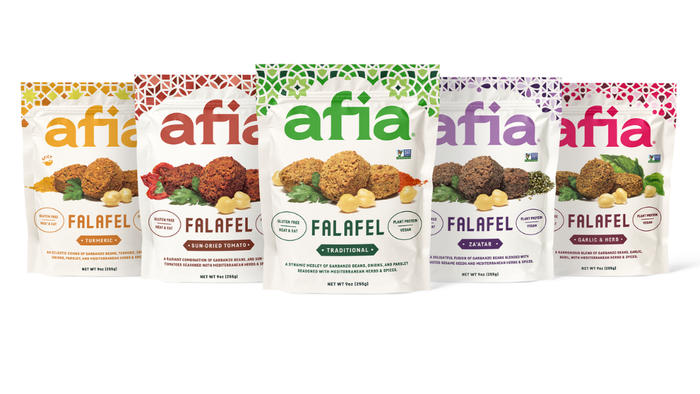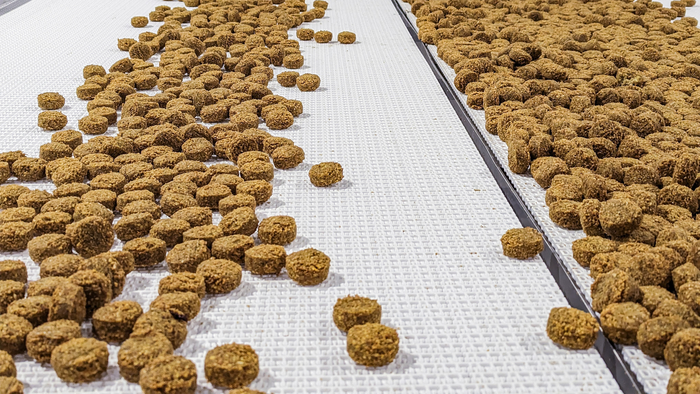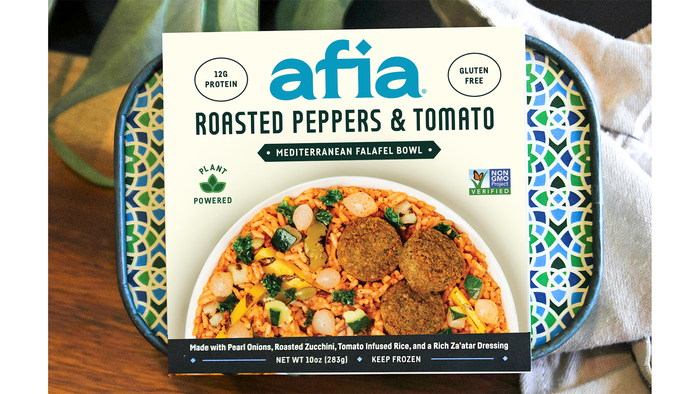Afia Foods elevates Mediterranean flavors while uplifting refugeesAfia Foods elevates Mediterranean flavors while uplifting refugees
Farrah Moussallati Sibai’s natural food brand honors her Syrian heritage, assists Syrian refugees and helps her move forward from loss. Read her story.
December 12, 2023

Blending traditional recipes with modern formulation and convenience, Afia is shaking up the frozen aisles with its signature falafel, kibbeh and new Mediterranean falafel bowls. Made with clean, whole-food ingredients, these heritage-inspired, heat-and-eat offerings have filled a huge gap in the marketplace, propelling Afia from a farmers market upstart to a national brand found in 3,000 retail doors and numerous food-service outlets.
But beyond its impressive growth trajectory, this Austin, Texas-based, woman-owned company has an incredible origin story and laudable mission.

Though neither had food industry experience, Afia co-founders Farrah Moussallati Sibai and Yassin Sibai, both of Syrian heritage, took a leap of faith and launched the business in 2017. In doing so, the spouses aimed to elevate and share their family’s favorite foods while also giving back to the community and offering a lifeline to Syrian refugees.
By all measures, they’ve succeeded. In terms of accolades, Afia’s Roasted Peppers and Tomato Mediterranean Falafel Bowl recently earned the NEXTY Award for Best New Frozen Product at Natural Products Expo East. And in terms of impact, the company’s is perhaps immeasurable.
Here, Moussallati Sibai shares more about her family’s journey and their dynamic brand.
What was your background before launching Afia Foods?
Farrah Moussallati Sibai: Growing up, I always wanted to be a lawyer or doctor, but life took me down a different path. I studied business whilst living abroad in Syria and raising my daughters. I worked as a [foreign exchange] trader for a short time but was far more drawn to entrepreneurism after running a successful e-commerce business. Little did I anticipate or believe that my journey would lead me not only into the food industry, but [also] into both the CPG and manufacturing worlds.

Afia Foods' first prouct was frozen falafel, made from co-founder Yassin Sibai's mother's recipe. Credit: Afia Foods
What inspired you to launch Afia Foods?
FMS: Afia’s origins start with my personal journey and the adversities I faced: the loss of my youngest daughter, my middle daughter’s severe kidney disease treatment, a years-long separation from my eldest and the upheaval caused by the war in Syria. These challenges pushed me to forge a new path for myself and my daughters when I decided to marry Yassin and relocate [from England] to Austin, Texas.
I arrived in Austin at the same time as there was an influx of refugees in need. My empathy for their struggles to start over led me to volunteer to help them, and I realized how much more I could give if I had a business that I could use to support them. The shape that business would take was influenced by seeing firsthand the profound power of food to provide comfort.
During this same time, my mother-in-law had hours to pack her life in a bag before the borders closed in Syria. She packed her generation-old recipe book, which brought her and our whole family comfort in our new home. These recipes reflect flavors of the Mediterranean and Middle East that people love, but I saw a gaping white space in the market. There was nothing like it, particularly in the frozen aisle where I would look for convenient options.
I saw the chance to start a new business that would offer consumers something they want while allowing me to support refugees and show my now five daughters that you can start from the ground up and anything is possible.
Our goal at Afia is to fill this market gap with authentic, convenient products made with clean, quality ingredients, making them accessible to everyone whilst supporting refugees and giving back to the community.
How does your heritage shine through this brand?
FMS: Our roots start with our name. Afia is an Arabic word that means “to your health” and is used across all Arabic dialects. Our branding is built on the pillars of vibrant patterns inspired by Syria’s history of artisan tile work, and our logo blends tradition and modernity in reflection of our products.
Our products start with traditional recipes in my mother-in-law’s recipe book that we infuse with modern flavors. Future products [will] continue to start with her recipes and conversations with her and our family about the best way to bring our favorite flavors and foods to market. My mother-in-law still checks our products to ensure they’re up to her standards, and I expect that to continue!

Afia Foods built its own manufacturing line in Tyler, Texas, so it would have complete control over quality and flavors. The company offers jobs to Syrian refugees. Credit: Afia Foods
Why did you choose to self-manufacture versus using a co-packer?
FMS: Despite having zero experience in manufacturing, we opted to produce our own products to maintain control of our recipes and quality. Emphasizing quality and our customers’ experience demands meticulous care during production. We believe this is achievable only when you’re at the helm and handling manufacturing.
We built our processes from scratch to develop unique methods that scale the homemade quality of these traditional recipes while capturing the essence of what makes them great. This attention to detail ensures that the quality, texture and taste align with our standards and reflect the authenticity of our recipes.
What has your growth trajectory been like?
FMS: When we started, our production capacity was 2,000 falafel a day, with two team members: myself and Yassin. Our manufacturing capabilities have grown to 500,000 falafel a day at our facility in Taylor, Texas.
We’ve also grown from the falafel and kibbeh to three lines, including our Mediterranean Falafel Bowls, four meals inspired by dishes we eat back home—including burghul bi banadoura, our Roasted Pepper and Tomato meal that won the NEXTY, and mujadara, our Crispy Onion and Lentil bowl. Each includes three traditional falafel in sustainably packaged bowls designed with our heritage Syrian pattern. We are now streamlining production of this line to reach up to 15,000 meals daily.
As our manufacturing capabilities grew, so did our reach. Our team has expanded from two to 25 hardworking individuals who are integral to Afia’s success.
How does your company support refugees?
FMS: Our first hire was a refugee who escaped the Syrian war with his wife and three daughters. Struggling upon arrival, they found a safe, supportive environment with Afia. Employing refugees is a priority to this day, and we’ve worked with local agencies to source new hires and mentored those aspiring to start small businesses. Last year, we covered a refugee’s university tuition, and we dream of expanding our efforts as we grow. Additionally, we’ve donated over 350,000 falafel to the community through food banks and to refugees through nonprofits.
What have been your biggest challenges along this journey so far?
FMS: Building brand recognition and product awareness. Our products boast great attributes—authenticity, clean ingredients, gluten-free and vegan options, affordability, convenience—but reaching a broad audience remains our key challenge. Fortunately, Mediterranean food is booming in the U.S., and more people are being exposed to falafel, kibbeh, za’atar and shawarma. We’re well positioned to capture consumers’ attention as they look for options in grocery stores.

Afia Mediterranean bowls are available in four flavors. The Roasted Peppers and Tomato bowl won the 2023 Expo East NEXTY Award for Best New Frozen Product. Credit: Afia Foods
What was it like to win the NEXTY Award for Best New Frozen Product at Expo East? What does this accolade mean to your brand?
FMS: Receiving the NEXTY was a genuine honor. We believe so strongly in our products, and it’s so gratifying to have the industry recognize one and specifically call it out for differentiation in flavor and packaging. Winning in a rapidly growing, highly competitive category is encouraging. The NEXTY Award creates ripple effects in expanding our exposure and drawing attention to how we’re offering something unique in the frozen aisle.
About the Author
You May Also Like



